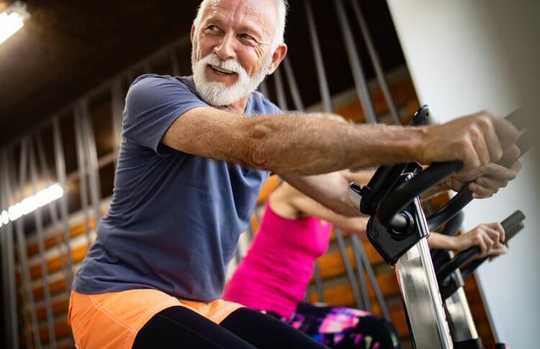
Even just a bit of intense physical activity prompts a “clean-up of muscles” as the protein Ubiquitin tags onto worn-out proteins and causes them to degrade, according to a small study.
This prevents the accumulation of damaged proteins and helps keep muscles healthy.
Physical activity benefits health in many ways, including the building and maintenance of healthy muscles, which are important for our ability to move about normally, as well as to fulfill the vital role of regulating metabolism. Because muscles store most of the carbohydrates we eat, our muscles are extremely important for regulating metabolism, researchers say.
“Basically, it explains part of the reason why physical activity is healthy.”
Get The Latest By Email
Part of our ability to maintain muscular function depends upon eliminating worn-out proteins—the building blocks of muscles—in a kind of clean up process that allows freshly synthesized proteins to take their place.
Now, researchers have demonstrated that a single, intense, roughly 10-minute bicycle ride results in a significant increase in the activity of Ubiquitin, the “death marker protein,” and a subsequent intensification of the targeting and removal of worn-out proteins in muscles, key to our ability to maintain muscular function.
“Muscles eliminate worn-out proteins in several ways,” explains Erik Richter, head of the Section for Molecular Physiology in the nutrition, exercise, and sports department at the University of Copenhagen.
“One of these methods is when Ubiquitin, ‘the death-marker,’ tags a protein in question. Ubiquitin itself is a small protein. It attaches itself to the amino acid Lysine on worn-out proteins, after which the protein is transported to a Proteasome, which is a structure that gobbles up proteins and spits them out as amino acids,” Richter says.
“These amino acids can then be reused in the synthesis of new proteins. As such, Ubiquitin contributes to a very sustainable circulation of the body’s proteins.”
While researchers have accumulated extensive knowledge about how muscles regulate the build-up of new proteins during physical training, much less is known about how muscle contractions and exercise serve to significantly clean-up worn-out proteins.
“The important role of Ubiquitin for ‘cleaning-up’ worn-out proteins in connection with muscular activity was not fully appreciated. Now we know that physical activity increases Ubiquitin tagging on worn-out proteins,” says Bente Kiens , a professor of molecular physiology.
For the study, six healthy, untrained men ages 26-28 years-old completed an 8-11 minute training session on an exercise bike. The researchers took blood tests and muscle biopsies prior to and upon the completion of their training session.
Thereafter, they studied the muscle biopsies using mass spectrometry, which demonstrated how Ubiquitin was used on a large scale to clean up damaged proteins.
Jørgen Wojtaszewski, also a professor of molecular physiology, explains that the findings serve to strengthen the entire foundation for the effect of physical activity. “Basically, it explains part of the reason why physical activity is healthy,” he says. “The beauty is that muscle use, in and of itself, is what initiates the processes that keep muscles ‘up to date,’ healthy, and functional.”
There remains a great amount of knowledge that would be interesting to delve deeper into, as very little is known about how different training regimens, gender, diet and genetic background impact the process and thus, the possibility of influencing optimal muscle function.
The study appears in the FASEB Journal. Additional researchers from the University of Sydney, Australia contributed to the work.
Funding for the study came from Independent Research Fund Denmark and the Novo Nordisk Foundation.
books_fitness







